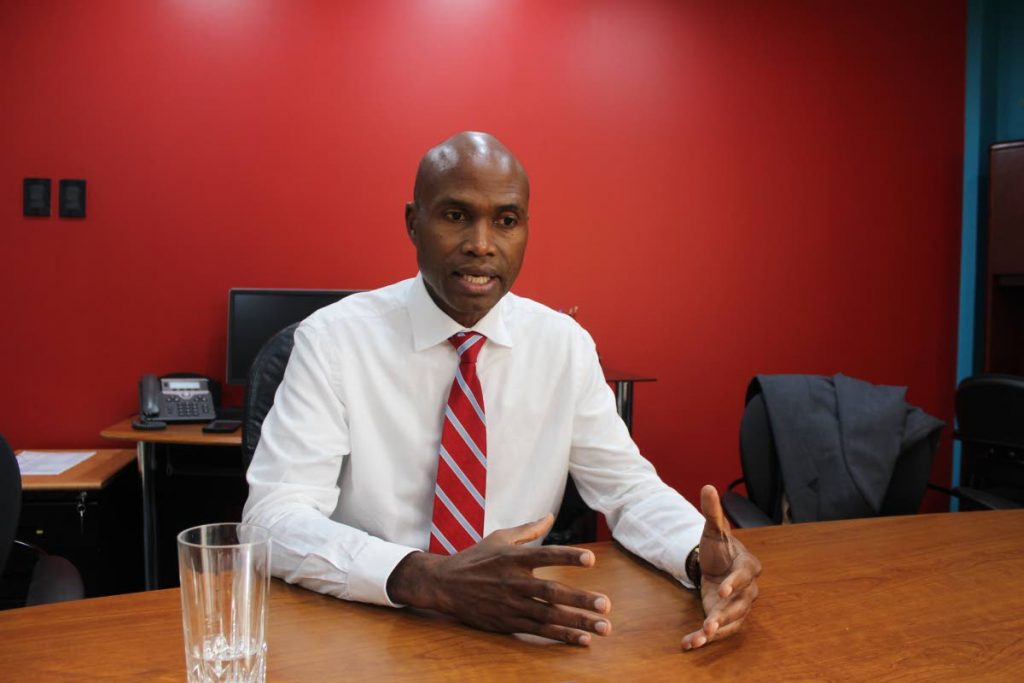Making banking accessible

Ronald Carter sees his role as a banker to help people. And that intersects well with the vision of the company he now helms, JMMB Bank (TT).
“My daughter asks what I do or a living and I say I help people. I’m very passionate about financial services and financial literacy and the opportunity it gives to help people improve their and their families’ quality of life,” Carter told Business Day in a recent interview at JMMB’s Independence Square office.
A third of people globally around the world are financially illiterate, he said, and helping people onto a path of financial independence can have beneficial multiplier effects for the whole society. “That’s what I love doing.”
Carter, a veteran of the local and international banking sector with over 30 years’ experience, assumed the helm of JMMB TT on August 1, taking over from Nigel Romano. At the same time, the company also implemented changes to the group structure level, so in addition to being the managing director/CEO, he’s the chief country officer for TT, with oversight of all the operations here.
JMMB has been in TT since 2005, first through a 50 per cent stake in Intercommercial Bank, of which it then acquired 100 per cent in 2015. The reason the bank might seem new to people is because it didn’t rebrand as JMMB TT until 2015.
A new model for a changing world
But it’s been quietly and successfully increasing its business through two key strategies: expertise and service.
“Expertise in a financial environment is critical because the level of expertise (you can) bring to a consumer immediately redounds to better value for them. Service is commonly spoken (of), but for us, what’s different is our unique culture where we focus on ensuring team members are taken care of in a culture that is very inclusive and solutions-oriented. And when you have a highly engaged team, there’s a natural flow to good service.”
The company, then, is moving away from traditional realm banking to more intimate interactions. Part of that service delivery is making customers feel welcome. There are no lines at JMMB offices, Carter points out, and if a client can’t come in, team members go to them.

It appears to be working, as Carter reported that numbers are growing “significantly.”
The company's view of continued expansion is that is is "not going be centred on bricks and mortar but on leveraging technology, doing business where clients want it – so we have a focus with getting team members out and meeting clients in their own space, at their own time.”
He believes people are feeling the difference.
“We are in an environment where a lot of people are unhappy with the level of care and service they get at banks. Here, they’re seeing and feeling a difference. At JMMB, there’s no line, people are happy to see you.
"That’s what I hear from our clients: that we’re different. It’s that feeling of service and being valued for their business.
"Growth is across the board, not just, say, millennials looking for a more convenient option to their parents’ banks, although that is a trend they are seeing. It’s a different generation. They don’t want to come in because they have things to do. (If we can) innovate on account opening, online banking to allow clients do several transactions very easily without coming into the bank…Our conversations are solutions-oriented to make it easy and empowering. That’s our mantra.”
Among older clients, it’s people who appreciate the sense of feeling valued.

“People are more and more sensitive towards going towards services where they believe they are being treated well and where they are getting value. There’s a whole marketing science around making a client feel valued. When you deliver value, that’s when you find you have the ability (to keep clients).”
Towards financial inclusiveness
At its core, though, JMMB wants to make sure its customers understand financial management.
“JMMB was really born out of making banking accessible, and one of the things at the core of our strategy is building financial inclusion, going into communities and teaching people about money management.”
It’s also about getting to those who are "unbanked." Opening a bank account is famously a hassle, with all the myriad requirements of know your customer (KYC) regulations. JMMB works with customers to make that a little less stressful.
“We have an internal initiative called client-friendly compliance. Part of it is understanding that we have regulations around KYC, but we believe we can innovate around how we meet those requirements and still be client-friendly.”
Having a form of identification is non-negotiable, for example, but proof of address can be a little more lenient. Some places require a utility bill, but Carter says JMMB allows for site visits to satisfy that requirement.
“One of our guiding principles is how to make it easy for clients. That’s another thing we see is a big demand in the market. People want it easy. Make it easy for me to open an account, make it easy to interact and speak with you. Make it easy for me to transact.”
The bank has also revamped its online banking platform (which Carter believes is the best among commercial banks), while still offering those who want that “touch and feel” experience to come into its physical locations. The bank is also standardising its operations across the group, something it hopes will make it easier to interact with clients across the board.
The bank has also announced a partnership with Canadian firm Alignvest Acquisition II Corporation, which last year announced a takeover of Barbados-based insurance provider Sagicor for US$536 million.
JMMB will take an equity stake “north of 20 per cent” in the new entity, New Sagicor, when it relaunches.
“It’s a strategic alliance for us that gives us the ability to diversity our income stream as a group, because right now we have almost no insurance business as part of our portfolio. We have remittances, brokerage, investments, but one of the big pieces we don’t have is insurance. So it complements our financial suite from a commercial perspective as well as opens the door to have strategic conversation around insurance and insurance solutions.”
Framework for growth
Carter also advocates, like many of his industry colleagues, for a speedy and efficient implementation of legislation necessary to make TT compliant with Global Forum and Financial Action Task Force regulations in order to avoid being derisked or blacklisted by international financial markets as potential tax havens.
“I think we as a country have an opportunity to be better, more proactive from a legislative perspective. These things affect us, they affect correspondent banking relationships (and) are very critical.”
JMMB is an active member of the Bankers’ Association and has used the organisation as the vehicle through which it lobbies its cause.
“(Even though) we (JMMB) have relationships outside of TT, that’s not going to make a difference. It’s going to impact all of us as TT banks negatively if we don’t pass (compliance). And we have to be more sensitive on a national level on understanding the impact on how the global financial world views us.”
He said he’s had reports of nationals who have already been individually derisked simply by being associated with TT.
“When international banks look at their client list and see you have a connection to TT – they are literally closing your account. So that’s how it’s affecting everyone across the board. We see numbers of clients who have had situations like that who had an account abroad and were individually derisked.”
The other issue plaguing the industry is foreign-exchange availability. While he admits the crunch is there, he’s not too concerned about the impact on the bank’s ability to grow its domestic market share.
“Like all other banks, we have to educate our clients. Naturally they want to get more forex, but we know they understand the overall national situation. So we manage it as best as we can.”
The Central Bank’s injections into the system is the primary source of US dollars, but the size of its interventions in the market has been reduced, he noted.
“It doesn’t stymie us from a growth perspective, because when you look at the biggest users of forex, it's large corporations. The average retail individual client aren’t big users. That’s not a massive draw – it is constrained but the biggest impact is bigger-ticket corporate.”
That’s not JMMB’s focus right now, rather, it wants to grow the retail sector and, within that, those people who need help with money management, including a special focus on small and medium enterprises, for which it will soon launch a specialised unit.
Jamaica vs TT
Asked his perspective on the dichotomies of the Jamaican and TT economies, Carter acknowledged that Jamaica is very much on an upswing, right now.
“I think there are two things I’d say from a Jamaica perspective. Looking at it historically you see a hunger and a high entrepreneurial spirit and you see it translated down to the level of financial literacy and sophistication. Not having a ready natural resource that gives an inflow of income, naturally you have to be more innovative around how to generate revenue.”
One of the contributors to this upswing, and something TT can piggyback off, he believes, is Jamaica’s governance structure around growth.
“It has growth targets that are broken down into quarterly metrics around what are the aspects of growth and you have a body that sits outside government and reports and comments on how the country is doing against those targets. TT is sort of slowly building. We need to have more deliberate, long-term targets and a discipline around how we get there and monitor to make sure we actually get there.”
It’s basic performance management, he says. “If you don’t break down your goal and monitor it then you aren’t going to achieve that goal.” The country has also focused on making business easy. “You’re seeing initiatives there around ease of doing business. We can certainly take a few lessons.”
His overall view is that there’s a high level of frustration among customers in the financial services sector.
“For us that’s an opportunity and how we’ve been able to expand rapidly. I see that unless business changes and become more focused on delivering value they are going to lose market share to entrants that are hungrier and nimbler, and that is one of JMMB’s competitive advantages.
"We have a very flat structure. I report to the group CEO. We are very entrepreneurial and that redounds to a very clear focus on how we help clients. There has to be a deliberate focus around the client because that’s where the client is very discerning.”
Technology will also transform the landscape as generations evolve and migrate to newer platforms. The increase in technology will also see a rise in alternative providers, like new payment platforms and other fintech (financial technology) solutions.
“We need to stay at the forefront of these technologies and not lag. That’s critical for us in TT when you look at other Caribbean jurisdictions who are (adopting and adapting).”
Is legislation holding the country back?
“Some of it, yes but that’s solved in two ways – changing the regulatory framework, yes, but we, the industry, also must recognise we need to push for those changes even more. We need to make sure we are not lagging behind.

Comments
"Making banking accessible"